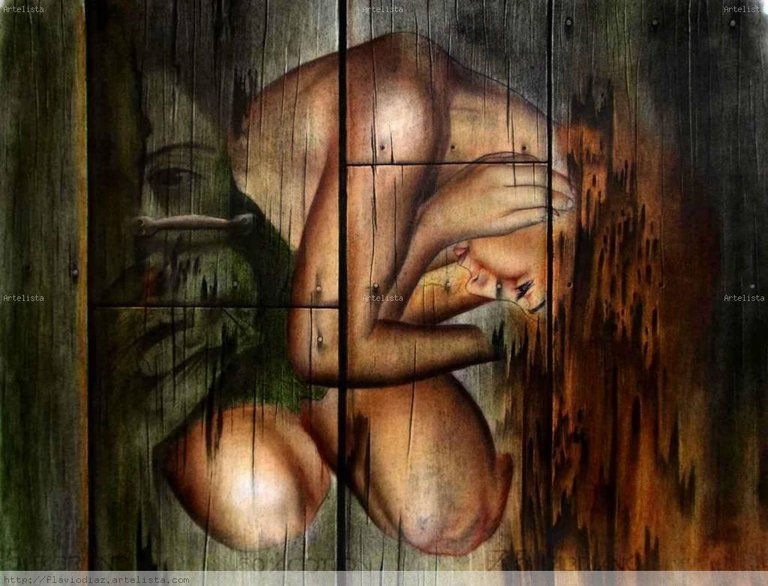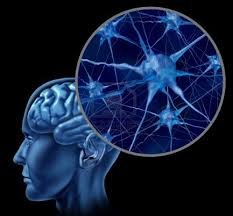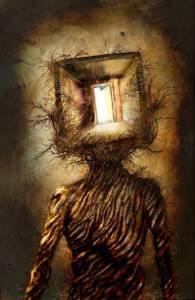
Insanity—a perfectly rational adjustment to an insane world.~R. D. Laing
Is mental illness a disease? Is it a scientifically verifiable fact? More specifically, is schizophrenia—the holy grail of psychiatry—a "real" brain illness?No one should jump the gun. In most cases, it is probably not a physical illness. There are a lot of problems with the idea that schizophrenia is an illness. I am going to clarify two of those problems in this article, including the falsification problem and the problem of diagnosing.
However, before I dig in, I have a disclaimer: I am not claiming that people do not suffer from psychological difficulties or problems dealing with contemporary reality. I am only humanizing people. I am offering hope for healing and change.
Caged Animals, Rebellion, and Schizophrenia Symptoms
We live in an increasingly hostile and impersonal world, and it is no surprise that more and more people are having volatile reactions against it.In this sense, it can be said that schizophrenia is an individually manufactured set of behaviors and coping mechanisms to deal with the exigencies of a troubled life. It is the same kind of behavior caged animals display when living in deplorable environments. In a similar vein, psychologist Bruce Levine referred to the so-called "illness" as a form of rebellion against the systemic injustices and malfunctions of society.
Schizophrenia, then, is not a likely disease. Instead, it an experiential mental state that other people see as strange, wicked, abnormal, or crazy. It is subjectively vilified. Thus, the people who manifest its symptoms are likewise vilified.
But why are people vilified? What are the "symptoms" schizophrenia?
For anyone unfamiliar with schizophrenia, people who suffer from it usually manifest "positive" and "negative" symptoms. The positive symptoms are said to be the worst. They include auditory and visual delusions and hallucinations. The negative symptoms are social problems, motivation issues, and speech issues.
But with these horrid "symptoms," why would schizophrenia not be a disease?
Schizophrenia cannot Easily be Falsified
If schizophrenia exists as an objective brain malfunction or disease, it should be easily falsifiable.Falsification criteria or falsifiability in science denotes that a theory can be disproved, hence falsified. In other words, what evidence or proof could disprove something's existence as an objective reality?
This truth topples the idea that schizophrenia is a disease.
If someone could falsify brain evidence for schizophrenia (for which very little exists), they would simply point to healthy brains or bodies without markers of the disease.
However, the problem is that many people are diagnosed with schizophrenia without clear abnormalities or differences. There is no single biological marker to pinpoint it and differentiate it from a healthy brain. This is because schizophrenia is diagnosed on behavior patterns, not brain scans, blood tests, or any other objective measure.
The DSM and the Problem of Labeling
Psychiatry in general is built upon this foundation of cultural bias and subjective valuations. It is the reason why the DSM has been revised and altered, and why some diseases have been "removed," while others have been "added."The DSM, or Diagnostic and Statistical Manual of Mental Disorders, is the psychiatrists' Malleus Maleficarum for the modern day; it is their holy compendium that contains all the mental maladies of the modern era.
Recently, the DSM 5 added hoarding as a brain "disorder," and a few years back added, "oppositional defiant disorder." With this in mind, notice that homosexuality and sexual addiction were also disorders or diseases, which were removed from the psychiatric bible.
This poses an interesting question.
If psychiatrists can remove a "disease" or "disorder," was a patient's problem ever a disease or disorder to begin with? Was the "problem" just a behavioral trait that changed with the times, from socially unacceptable to socially acceptable...like homosexuality?
Could you imagine people coming to accept schizophrenia as just a strange mindset or unique character?
Some cultures have even viewed the people we call "schizophrenics" as "medicine men" or "shamans," therefore imbuing them with tremendous social influence. This is the opposite of the western world, where people with schizophrenia are seen as troubled or broken.
This is the problem with diagnosing based on behaviors. It is all subjective and culture-bound.
Psychiatry is Fraudulent, but There is Hope
Indeed, psychiatry must be fraudulent if it contends that "strange" or "troubled" behaviors like schizophrenic "symptoms" are diseases or disorders. Analyzing people through the lens of a medical model, when no medicine or doctor is necessary, only hurts people and makes everyone distrustful of psychiatry.This is especially true when there are not clear scientific methods to falsify the existence of said disease. In this regard, it is no wonder that psychiatrists can vote for and pick what illnesses they want in the DSM. They can just create disorders out of thin air like the FDA creates fiat currency.
Using pseudoscience to make cattle out of people, legitimize chemical lobotomies, electroconvulsive therapy, and other forms of "treatment" is a stain on human decency and dignity that will never easily be wiped away.
Nonetheless, there is hope for those who have been labeled with "schizophrenia."
More people are starting to speak out against the depredations of psychiatry, and the truth of its injustices are coming to light. There is ample scientific evidence to run contrariwise to psychiatric dogma.
In this light, more people are already becoming "psychiatric survivors" as they start to realize that their brains were not broken to begin with. They were just different, rebellious, and in need of cultural and personal change. I see more of these brave individuals speaking their mind as psychiatry starts to lose its foothold on many people.
Mental illness, of course, is not literally a 'thing'—or physical object—and hence it can 'exist' only in the same sort of way in which other theoretical concepts exist.~Thomas Szasz
My name is Sterlin. Follow me @ Psychologic-Anarchist. I also run the Psychologic-Anarchist Facebook page and produce many YouTube videos. My interests lie in the intersection of counseling psychology and anarchism. I write about the depredations of psychiatry, and also the new philosophy of compassionate anarchism. We have a large community devoted to discussing psychology and relational voluntaryism.




I hear voices, and was only able to see them as useful pieces of my brain and balance the need to demonize them as crazy talk or spiritualize them by reading Muses, Madmen and Prophets by Daniel Smith. As a neurodiversity supporter and special ed teacher, it was all about how the person coped with this culture and society, and providing equal parts coping techniques and changing pieces of society to make it easier for them. I can listen to my voices if people are quiet and allow me to space out, or talk with them in my religious practice, and they won't cause me trouble as long as I am in a fair to good mental state, so lots of meditation and not lying to myself, or else the voices will be there to force me to look at what I'm trying to run from.
I really love this perspective, Sorc. Thank you for sharing. I am also a strong advocate of the neurodiversity movement as well as acknowledging that people may have "mad gifts," as the Icarus Project people put it.
Thank you for sharing.
@sorcpenz that is a book I need to read! Thank for that.
If you believe things to be true which are provably not true (which is generally the case with schizophrenia), then that is not simply a subjective thing, you objectively have some kind of problem.
I've known a couple of people with this diagnosis and they aren't just cooky or different, they have a crippling disconnect between themselves and reality that makes their life incredibly difficult as well as sometimes making them a danger to themselves and others.
Yes, but where did this disconnect come from?
Hey DCsignals, I would love to have a dialogue about this, because I disagree in most cases.
I have stated that schizophrenia is a subjective issues, because there are no clear biological markers for the alleged disease. It is true that it is not subjective that people suffer. Obviously they have difficulties with life as I pointed out. However, that is not to say that it is a disease in the medical sense.
I hope that helped clear thing up. Thank you for commenting.
Great article, cutting analysis, and awesome concepts-- "compassionate anarchism".
What's next, @sterlinluxan?
Ah, the big business of psychopharmacology. This is where they come in. But before them you have Big Pharma themselves whose entire existence is based upon people believing they are "sick." Thus new conditions are invented every day to go with the myriad of pills in the works. "Hey, we got this new drug - let's invent some new affliction."
Nice to see someone try to address this and have an r.b. laing quote
Absolutely. Thanks for recognizing my efforts. I haven't seen much material like this on Steemit yet. Have you seen anything else?
nope, but I think I will add some blogs to this area. I grew up with a schizophrenic parent and agree with laings views. I am one of the only people who knew how to talk to my mom when she is not on medication. I could still make her laugh. That's important. You need to see the humanity and not the stigma. Stigmatisation doesn't help someone with paranoid tendencies. The word schizophrenic labelled on someone can be a form of name calling which has a dehumanising effect.
Sterlin I like this post. I have had both, a friend who totally had a psychotic breakdown where she was hallucinating that her friends and family were strangers and she got physically out-of-character violent... With her, to my eyes, she looked as if she was possessed by another energy not her self... and I was glad there was a psych team with tranquilizers and a mental ward to temporarily restrain her. Over years, on and off several meds, with a lot of love and support from family, she became totally well and has been completely "normal" ever since for 20 years. The other was a male friend on meds for schitzophrenia, was threatening to suicide one night to the OOO Operator, who told him they couldnt send an ambulance until he had actually harmed himself. (Government service) He ended up calling me at 2am, a friend and I picked him up, gave him hot chocolate, cookies, a joint and a bed and he was fine the next day. Your post is important because we are all discouraged for looking for the simple human solutions and we put labels on things and think the only answer is meds
I met a schizophrenic once that kept looking at the time of the watch on his arm, but he wasn't actually wearing a watch. From that point on, I generally knew what a schizophrenic was.
Sure, that is a kind of behavior that can be problematic, but that does not mean it is an illness or disease. That was my main point here.
An interesting way of looking at things. I think the important question about what makes a disease is what the subjective effect of their symptoms is on their lives and those around them. This definition does inevitably involve cultural definitions of normality which are not fixed and are in constant flux. There is no simple solution though and believing that psychiatry is inherently negative is extremely simplistic.
I don't really agree with your stance but I think it is very stimulating and well written. Thanks for posting:)
I see you mentioning that schizophrenia can be 'problematic' but it is not a 'disease'. I m just wondering, what is your definition of 'disease'? I have met dozens of people with schizophrenia. I say that I was in a privileged position since I didn't at the time have to take the decision to whether treat these patients or not. I did notice a pattern, which will make me partly agree with you...Any sort of Hallucination, immediately meant pills. That was an awful thing. I remember a patient in his late 20s, he had mostly auditory hallucinations. He believed the sun was the physical presentation of God and he could communicate with it. His quality of life was still pretty decent. He didn't really believe he had a problem, but his parents made him come to the hospital....and the hospital took care of him. A couple of months later our pills took care of his hallucinations but also removed his quality of life. And then he became just another file in the hospital records. In cases like this I WILL agree with you. But please, don't tell me that patients who are brought to the hospital after they cracked holes on their skulls trying to get rid of the voices, patients full of scar marks on their arms because the 'voices told them to do it' are NOT SICK. There is plenty of on-going research but just because no one has discovered the ''magic biomarker' yet, it doesn't mean there isn't a biochemical or structural abnormality underlying. With most other 'psychiatric diseases', I will agree with you...mostly bullshit.
Thank you!